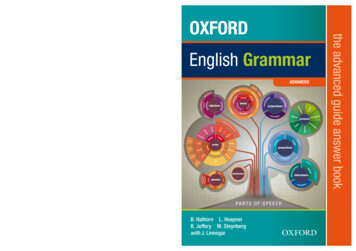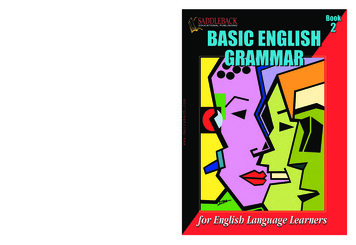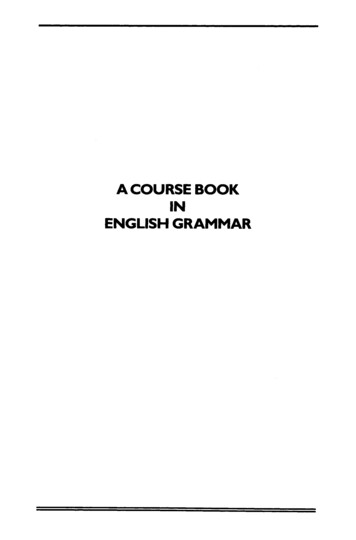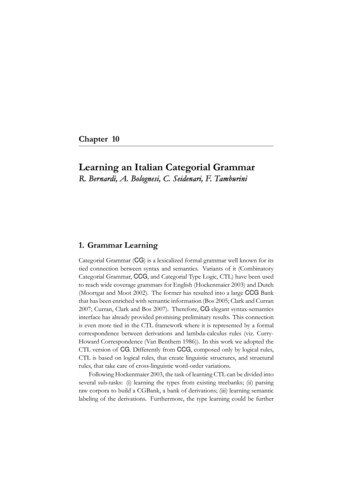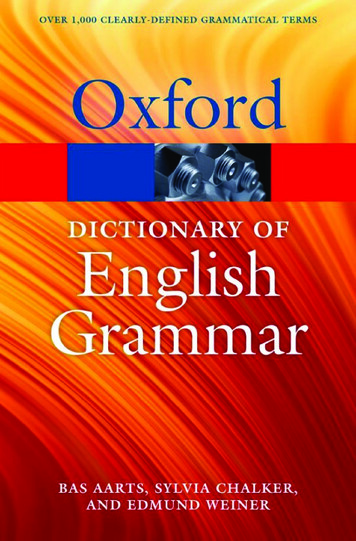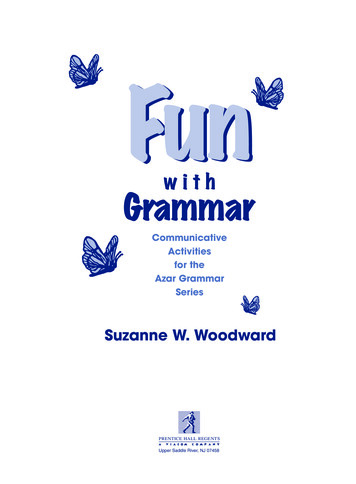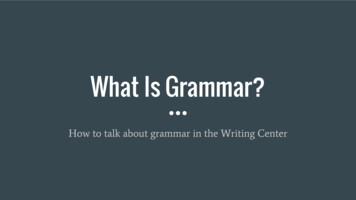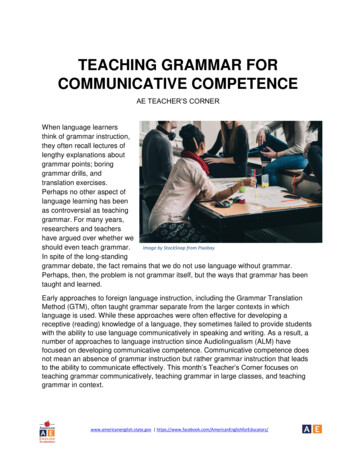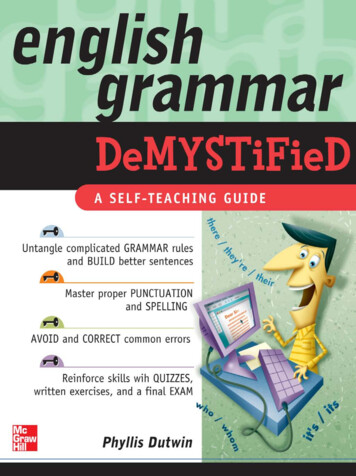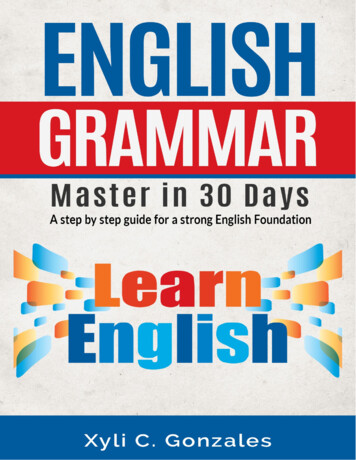
Transcription
ENGLISH GRAMMARMASTER IN 30 DAYSA step by step guide for a strong English foundation.Xyli C. Gonzales2
IntroductionThe historical backdrop of English punctuations starts late in the sixteenth century withthe Pamphlet for Grammar by William Bullokar. In the early works, the structure andstandards of English punctuation were stood out from those of Latin.English punctuation is the structure of expressions in the English dialect. Thisincorporates the structure of words, expressions, statements and sentences.English is thought to be a standout amongst the most essential dialects on the planet.There are numerous reasons why English is so critical. One reason is that English istalked as the main dialect in numerous nations. There are 104 nations where English istalked as the principal dialect.Albeit English is the dialect of such a variety of nations, more individuals on the planetcommunicate in Mandarin Chinese as their first dialect. Mandarin Chinese is talked insixteen nations.Indeed, even in nations where English is not the local dialect, individuals use it forbusiness and tourism. English is utilized for these reasons as a part of generally nations.English is viewed as the business dialect. English is the official dialect of the UnitedNations. English is likewise the official dialect of carriers and airplane terminals. Allaircraft pilots that fly to different nations must have the capacity to communicate inEnglish.There are various types of English like British English, Canadian English and AmericanEnglish. These are not separate dialects. They are tongues. A vernacular is the routeindividuals in a specific spot talk their local dialect. In one spot, individuals may have aname they get a kick out of the chance to use for something that is not utilized as a part ofsomewhere else. For instance: In Britain, they call the building where a movie is viewed asilver screen. In America, they call it a theater. This is only an alternate method fordiscussing the same thing. Both of the words silver screen and theater are English words,and can be utilized to portray a building where movies are watched, so both of thesewords are right. Remember that any type of English that you learn is great. There are nobetter forms of English. There are just diverse ones.My part is your aide and translator on a voyage through the vital piece of your brainwhich we call your linguistic use, I guarantee that it will work for you, obviously there isa condition: it will just work on the off chance that you have influence. Comprehension isat the heart of the book. This book is a comprehensive reference on the subject of EnglishGrammar. It is organized into easy to master lessons with examples that are easy to3
understand. The working formula is to use just 30 minutes of your time every day foronly 30 days in order to achieve our goal of mastering the topics. Do not skip theexamples and exercises. It is also good to practice daily what you have learned whenwriting like articles, reports and in your daily conversations.Take charge and be on your way to mastering the English Language.4
Copyright 2014 by - All rights reserved.This document is geared towards providing exact and reliable information in regards tothe topic and issue covered. The publication is sold with the idea that the publisher is notrequired to render accounting, officially permitted, or otherwise, qualified services. Ifadvice is necessary, legal or professional, a practiced individual in the profession shouldbe ordered.- From a Declaration of Principles which was accepted and approved equally by aCommittee of the American Bar Association and a Committee of Publishers andAssociations.In no way is it legal to reproduce, duplicate, or transmit any part of this document ineither electronic means or in printed format. Recording of this publication is strictlyprohibited and any storage of this document is not allowed unless with written permissionfrom the publisher. All rights reserved.The information provided herein is stated to be truthful and consistent, in that anyliability, in terms of inattention or otherwise, by any usage or abuse of any policies,processes, or directions contained within is the solitary and utter responsibility of therecipient reader. Under no circumstances will any legal responsibility or blame be heldagainst the publisher for any reparation, damages, or monetary loss due to the informationherein, either directly or indirectly.Respective authors own all copyrights not held by the publisher.The information herein is offered for informational purposes solely, and is universal asso. The presentation of the information is without contract or any type of guaranteeassurance.The trademarks that are used are without any consent, and the publication of thetrademark is without permission or backing by the trademark owner. All trademarks andbrands within this book are for clarifying purposes only and are the owned by the ownersthemselves, not affiliated with this document.5
Table of ContentsChapter I English GrammarDay 1 Two Methods of Learning GrammarSentencePart of SentencesSentence FragmentFour Basic Sentence StructuresChapter II Parts of SpeechDay 2 A. NounsDifferent Kinds of NounsThree Properties of NounsFifteen Rules in forming the singular and plural nounExerciseRules in Forming PossessionDay 3 B. PronounFive kinds of PronounForms of the Personal PronounsDay 4 Possessive PronounClassification of GenderExercise: Pronouns and AntecedentsDay 5 C. VerbsForms of VerbsFour Kinds of VerbsThree Parts of Verbs (The principal)6
Day 6 Tenses of verbsSix Basic forms (tenses of verbs)Day 7 Six tenses of the verb TO BESix Tenses of the Regular Verb CARESix Tenses of the Irregular Verb EATDay 8 Six Tenses in Progressive Forms of VerbsDay 9 Two group of VerbsVerb CAREExercise: Tense UsageDay 10Thirty Basic Rules in Subject-Verb Agreement and GrammarDay 11Verbs: VoiceMoods of VerbEnglish ModalsDay 12Agreement of Subject and VerbExerciseAgreement of Verb with Compound SubjectAgreement with Collective NounsAgreement of Verbs with Indefinite PronounsDay 13Special Cases of AgreementDay 14ComplementsComplements of Action VerbsComplements of Linking VerbsDay 15D.PrepositionsTwo Groups of Prepositions7
Day 16E.Cases of Nouns and PronounsThree Cases in EnglishCases of NounsCases of PronounsPossessive Case of Nouns and PronounsDay 17AdjectivesThree Uses of AdjectivesKinds of AdjectivesPronouns as AdjectivesDay 18Adjectives have ComparisonDay 19G. AdverbsKinds of AdverbDegree of ComparisonDay 20PrepositionPrepositional phrasesTypes of Prepositional PhraseThe Correct Use of PrepositionsDay 21I. ConjunctionsTypes of ConjunctionsExercise2: Prepositions and ConjunctionsJ. InterjectionsChapter IIIClausesDay 22Two Kinds of ClausesTypes of Dependent ClausesAdverbial clauses8
Subordinate ConjunctionsKinds of Adverbial ClauseExercise: Error DetectionSubordinate Conjunction commonly used in adverbial clause of the various typesDay 232. Adjective ClausesRestrictive and Nonrestrictive ClauseNoun ClausesNoun Clauses FunctionChapter Classifying Sentences based on ClausesDay 24Using Comma and SemicolonChapter Verbal’sDay 25Three Verb Form of VerbalParticiple verbalFour kinds of ParticiplesDay 26Verbal Analogy TestsTwo Distinct types of knowledgePrinciples of Taking Verbal Analogy TestsExercise: Verbal Analogy and RelationshipDay 27B. GerundsInfinitivesSplit InfinitivesChapter VI PunctuationDay 28Types of Punctuation1. Period2. Question Mark9
3. Exclamation Mark4. Quotation Mark5. ApostropheDay 29 6. Comma7. Colon8. Semicolon9. Parenthesis10. DashDay 30CapitalizationsList of Troublesome WordsAnswer KeyConclusion10
Master English Grammar in 30 Days!Chapter IEnglish GrammarDay 1“That is a good book which is openedWith expectation and closeIn profit”-Amos Bronson Alcott-English GrammarEnglish Grammar is related to expressing words in their singular and plural forms.Grammar refers to a systematic set of rules of a language. And structure of a language,like its skeleton. It is important for language learners to understand the rules of grammar,because if you use or order words incorrectly, your sentences will not make sense.Two Methods of Learning Grammar11
By using language or by learning the rules one by one. Applying them. (Most people useboth methods together.). Grammar tells us how to put a sentence together and the order asentence should have. Different languages have different grammar. People have studiedEnglish grammar for a long time. Many of its rules have not changed for hundreds ofyears, but some rules are changing because the way people use English grammar ischanging.SentenceA Sentence is a linguistic unit consisting of one or more words that are grammaticallylinked, and expresses a complete thought. It can include words grouped, meaningfully toexpress a statement, question, exclamation, request, and command or suggestPart of SentencesSubject is a person, place, thing, or idea doing or being something.Predicate describes the subject.SubjectPredicateThe lionroaredHewrites wellSheenjoys going to the cinemaThe girl in the blue dressarrived lateSentence FragmentSentence fragment is not a complete sentence, never have independent clause, butinstead are dependent clauses or phrase.12
Fragment can masquerade real sentences because they begin with a capital letter and endwith the period. It lacks the subject and the predicate even both the subject and thepredicate.Where to find the sentence fragmentsSentence Fragments usually appear before and after the independent clauses to whichthey belong.* When we got in the car. We rolled down the windows.“When we got in the car” are a sentence fragment and a dependent clause. It clearlybelongs to the independent clause that follows it and should be rewritten like this:* When we got in the car, we rolled down the windows.* We rolled down the windows when we got in the car.Declarative Sentence states a fact or an argument and it ends in the period.* There are ten million people at risk.* I am no wine connoisseur, but I know what I like.* Manila is the capital of Philippines.Interrogative Sentence asks a question. It ends with the question mark (?).* Where do you live?* Can you find my umbrella?13
Imperative Sentence is a command or a polite request. It ends with an exclamation mark(!) or it ends with a period. The subject is usually left out and is understood to be‘you’.* Please bring my umbrella.* You clear the road at once!Exclamatory Sentence expresses excitement, conveys a strong felling or suddenemotion. It ends with an exclamation mark (!).*You’ve broken my umbrella!* She is the thief!* That is beautiful!Four Basic Sentence Structures1. Simple Sentence is a sentence with only one independent clause. It is referred to as‘independent’ because, while it might be a part of command or complex sentence, it canalso stand by itself as a complete sentence.Simple Sentence has the most basic elements that make it sentence: a subject, a verb, anda complete thought.* The struggle is eternal.*Joy waited for the train.* The train was late. (“the train”- subject, “was”-verb)* Ann and Joyce took the bus. (“Ann and Joyce”- compound subject, “took”-verb)14
Compound Sentence is a sentence that contains at least two independent clausesconnected to one another with a coordinating conjunction.Coordinating conjunction is easy to remember if you think the words “FAN BOYS”.ForAndNotButOrYetSo* Joy waited for the train, but the train was late.* Ann and Joyce arrived at the bus station before noon, and they left on the busBefore I arrived.* Ann and Joyce left on the bus before I arrived, so I did not see them at the busStation.Complex Sentence is a sentence that contains an independent clause and at least one ormore dependent clause.Dependent Clause is similar to an independent clause, or complete sentence, but it lacksone of the elements that would make it a complete sentence.Dependent Clauses:* Because Ann and Joyce arrived at the bus station before noon* While she waited at the train station* After they left on the bus15
Dependent clauses such as those above cannot stand alone as a statement, but they can beadded to an independent clause to form a complex sentence.Dependent clauses begin with subordinating conjunction:AfteralthoughasbecauseBeforeeven hilewhereverComplex sentence are often more effective than compound sentence because a compoundsentence indicates clearer and more specific relationship between the main parts of thesentence.The word ‘before’, for instance, tells readers that one thing occurs before another.The word ‘although’, conveys more complex relationship than a word such as ‘and’conveys.Periodic Sentence is used to refer to a complex sentence beginning with a dependentclause and ending with an independent clause, in “While she waited at the train station,Joy realized that the train was late.”Periodic sentences can be especially effective because the completed thought occurs atthe end of it, so the first part of the sentence can be build up to the meaning that comes atthe end.Compound-Complex Sentence is a sentence with two or more independent clause and atleast one dependent clause. It combines the compound and the complex sentence.The “compound” part means that it has two or more complete sentences.16
The “complex” part means that it has at least one incomplete sentence.*His blue eyes were light, bright and sparkling behind half-mooned spectacles, and hisnose wasvery long and crooked, as though it had been broken at least twice.17
Master English Grammar in 30 Days!Chapter IIParts of SpeechDay 2“Speech is power:Speech is to persuadeTo convert. To compel.”-Ralph Waldo Emerson-Parts of SpeechPart of Speech in English Language, words can be considered as the smallest elementsthat have distinctive meaning. Based on their use and functions, words are categorizedinto several types or parts of speech. Noun, Pronoun, Verb, Adverb, Conjunction,Preposition, and Interjection.A. Nouns18
A Noun tells you what you are talking about.Nouns are names of persons, places, events, things, measures of times, action, quality inesDayDifferent Kinds of Nouns1. Proper Nouns are specific and are written in capital letter. It refers to a particularperson, place or thing.2. Common Nouns are general, refer to a class of people, places and things. Opposite ofproper noun.Common NounProper NounGirlJoybelCountryPhilippinesDayFridayDoctorDr. AngueTeacherJaynel3. Collective Nouns refer to nouns that are made up, not by single word, but by a groupof words, persons, animals or things.19
4. Mass Noun is the opposite of count noun.Mass noun is also called non-countable nouns, and they need to have “counters” toqualify them.Collective NounMass lassstars5. Concrete Nouns exist in the physical word.6. Abstract Nouns refer to ideas and feelings.Concrete NounAbstract mLionfriendship7. Count Noun- it refers to anything that is countable, and has a singular and plural form.KittenThree Properties of Nouns20videoball
1. Number of nouns (Singular and Plural)A. Singular- if the noun is only one, when a noun is refers to one person, place or ting.B. Plural -if it is two or more, a noun refers to more than one person, place, or thing.Fifteen rules in forming the singular and plural noun:A. Most nouns add the letter s to the singular to form the akesCatCatsEggEggsB. Add es to nouns ending in a hissing sound (s, ch, sh, x or esTaxTaxesQuizQuizzesC. Most nouns ending in f of fe change f to ve before ending s.21
thievesWifeWivesD. Most nouns ending in y proceeded by a consonant sound change y to i and add ysteryMysteriesProphecyPropheciesE. Nouns ending in y after a vowel add . Some nouns ending in o proceeded by a consonant add es.22SingularPluralGrottoGrottoesTomatoTomatoes
HeroHeroesMangoMangoesZeroZeroesG. Some nouns add en or change the vowel or remain eepH. Nouns ending in an o that is preceded by a vowel form the plural by adding ottoMottosI. Most compound nouns add s or es to the principal words of the compound.23SingularPluralBookcaseBookcasesRunner upRunner upsHandfulHandfuls
J. A few nouns are plural in form but singular in csNewsK. Some nouns form the plural by a change in the vowel, and sometimes the eToothTeethWomanWomenL. Some nouns have the same form for both singular and adsM. You just have to be familiar with the different ways that titles are made plural.Singular24Plural
MissMissesMr.Messrs.Mrs.No plural (sometimes Mesdames)MadamMesdamesN. Words taken from foreign languages usually retain their plural iterioncriteriaPhenomenonPhenomenaAlumnaAlumnae (Feminine)O. Adding the apostrophe (') and s forms the plural of numbers, letters, signs, andsymbols.Your card shows many grades of 1's.If your grades will be converted to our system, you will have a lot of A's.2. Gender means sexA. Masculine refers to maleFatherNephewPriest25
B. Feminine refers to femaleMotherSeamstressDaughterC. Common refers to either male or femaleCousinTeacherFriendD. Neuter has no sex at allChairBookCarSpecial feminine nounsSchoolShipCountryNatureExercise:Give the masculine or feminine gender of the following:1. Duke6. Lad2. Boar7. Emperor26
3. Indian8. Doe4. Baron9. Landlord5. Fox 10. Aviatrix3. Cases of NounsA. Nominative- if the noun is used as the subject, noun of address, predicate noun orappositive.* Jennilyn looks pretty in her red dress.* Maika, come and get your toys.* The winner in the oratorical contest is Jolina* Dr. Lucena, our new professor, discusses the lesson well.B. Objective- if the noun is used as direct object, indirect object or object of preposition.* The students are playing volleyball.* Leonardo sent Martha a love letter.* The concert was held in the park.C. Possessive shows possession or ownership.Rules in forming possessionA. Singular nouns added apostrophe and s ('s) for singular possessive, plural noun addapostrophe alone.27
Girl'sGirls'Student'sStudents'B. Those nouns that do not end with s, add’s to the plural forms.Oxen'sDeer'sWomen'sC. Add only an Apostrophe at the end of a proper noun ending in s or z.Reyes'Sanchez'Perez'D. Of phrase is placed after a noun.The dresses of a girlThe daughter of the presidentIn case of an inanimate object, the prepositional phrase with of is used. Noun-nouncompounds are also used.(Of phrase) (Noun-noun compound)The gate of the garageGarage gateThe roof of the houseHouse roofThing, places and concepts are often followed by of phrase to indicate association,measure or person.28
A box of candyA cup of sugarThe town of ManilaCertain possessive forms of noun denote time, distance, measure and value.A day's workA week's wageAn hour's restUncountable viorFurnitureStaffBlameInformationChalkJewelry
Master English Grammar in 30 Days!Day 3“Language, as well as the faculty of speech,Was the immediateGift of God.”-Noah Webster-PronounPronouns are words that are used in place of nouns, or pronouns are noun substitutes.Antecedent of the pronoun is the noun to which a pronoun refers. A pronoun must agreewith its antecedent in gender, person and otherMeAnybodyItThoseWeEverybodyItsAllHeTheyOurAny
NobodytheirOursbothSomebodyuseachtheirsNo whomsomeanyoneFive kinds of Pronoun1. Personal pronoun can refer to the person speaking, the person being spoken to, or theperson or thing spoken of.All the personal pronouns, with the exception of the pronoun it, refer to persons. Becareful with personal pronouns and learn how to use their various forms. They can bemost troublesome if you are not aware of their proper use.NumberPersonNominativeObjective CasePossessiveCaseSingularPlural1st personImemy, mine2nd personyouyouyour, yours3rd personhe, she, ithim, her, ithis, her, hers1st personmeusour, ours2nd personyouyouyour, yours3rd persontheythemtheir, theirsForms of the Personal Pronouns31
A. First person- personal pronouns referring to the speaker:SingularPluralIweMyourMineoursMeusB. Second person- personal pronouns referring to the person spoken to:Singular and Plural are similar: you, your, yoursC. Third person- personal pronouns referring to the persons or things spoken sItItsCompound personal pronoun sometimes is called personal pronouns. When the word"self" or "selves" are added to certain forms of the personal prono32
elfthemselves2. Interrogative pronouns introduce questions.WhatwhichWhomwhosewho* Which province do you prefer to visit?* What are your plans for the weekend?3. Demonstrative pronouns point out specific persons, places, or things.This- points out near object (singular0These- points out near objects (plural)That- points out far object (singular)Those- points out far objects (plural)The pronouns this (singular) and these (plural) are used to refer to the person or thingpresent, nearby, or just mentioned.On the other hand, you see that and those to refer to the person or thing farther removedor less obvious.4. Indefinite pronouns do not point out particular persons, places, or things.33
SingularPluralSingular or herothersmostNoseveralnoneNotsomeEveryNot onlyEachEverybodyEveryoneMany a oneNobodyNo oneNeitherOneOtherSomeoneSomebody5. Relative pronouns connect groups of words to another idea in the same sentence.That, which, who, whom, and whose are relative pronouns.Who is used when the antecedent is a person.That is used to refer to either persons or things.34
Master English Grammar in 30 Days!Day 4“A difficult situation can be handled in two ways:We can either do something to change it,Or face it.If we can do something,Then why worry and get upset over it- just change it.If there is nothing we can do, again,Why worry and get upset over it?Things will not get better with anger and worry.”-Shantideva-35
Possessive PronounsPossessive pronouns can also show ownership just like nouns.* This is my car.* Is that your car?1. Use the correct form of the personal possessive pronouns and do not use an apostropheto indicate whose* The Commission on Election failed to publish its findings.The word "its" is not a contraction between the words it and is.The word is used to convey the idea that the Commission on Election owns the findings.We can says then that its is a personal possessive pronoun.It's a lovely guitar.The word it’s in the sentence is a constriction of the words it and is. Moreover, there is noidea of ownership being expressed.Thus, it's is not a possessive pronoun.36
2. It is necessary to use the apostrophe and s to show the possessive forms of indefinitepronoun others, the apostrophe is added at the end of s without adding an additional s.Anyone’s jobsomeone's keyEverybody’s careach one's privilegeOne’s relativesother's affairs (singular other)Another’s booksothers' affairs (plural others)A pronoun must agree with its antecedent as to person, number, and gender.Classification of Gender (according to distinctions in sex)Masculine gender- he, him, father, sonB. Feminine gender- she, her, daughter, sisterC. Common gender- child, adult, cousin, neighborD. Neuter gender- computer, desk, mirror, bus4. When the pronouns all, any, some, and none refer to a number, they are generallyregarded as plural. When they refer to quantity or to a mass, they are regarded as singular.* All were waiting their turn. (All is plural)* There is no bread in the box. All of it has been eaten. (All is singular)A compound antecedent can be two antecedents connected by and.37
The coach and the players agreed on their game plan. (The pronoun "their" to acompound antecedent made up of the words coach and the layers.)5. In a compound antecedent, if both antecedents are singular and refer to differentpersons or things, the compound antecedent is considered to the plural.This also true if at least one of the antecedents is plural. The pronoun that refers to thecompound antecedent must also be plural.* Francis and his father postponed their trip.6. In the compound antecedent, if both antecedents making up the compound antecedentare singular and refer to the same person or thing, the compound antecedent is consideredto be singular. The pronoun that refers to the compound antecedent must also be singular.* The judge and executioner abhor his duties. (If the judge is also the executioner then thecompound antecedent is considered to be singular. In this case, the pronoun his agreeswith its antecedent in number.)7. Collective noun is singular when they designate a group acting as a unit. They areplural when the members that make up the group are acting independently. The pronounmust then agree with its antecedent as to number.Collective noun names a group of individual persons or things. It can take a singularform, although it is made up of two or more persons or things, if the collective noun actsas a unit.38AudienceclassCrowdfamilyJuryteam
Exercise: Pronouns and Antecedents1. The class was divided in (its, their) opinion of the new president of the university.2. (Who, Whom) is speaking please?3. She and (I, me) volunteered to go to Bora cay Beach to see the white sand.4. It was (they, them) who persuaded us to see a fortune teller.5. They wanted (us, we) girls to prepare the food for the party.6. He is willing to hire (whoever, whomever) comes first.7. That was (she, her) calling in the telephone.8. Don't mind (my, me) complaining.9. (It's, its) a fact; Paula is shorter than Tinting and (I, me).10. Everyone must keep (himself, themselves) busy.39
Master English Grammar in 30 Days!Day 5“Do not. Do to others what you will notWant them to do to you.”VerbsVerbs are action words. they express state of being.RuninterpretFeelareGiveForms of Verbs1. The base form: explain, listen, and eat2. The s form or third person singular: explains, listens, eats3. The "in" form or present participle: explaining, listening, eating4. The past tense: explained, listened, ate40
Four Kinds of Verbs1. Regular Verbs form their past tense by the addition of d/ed to the base form. Regularverbs have the same form both for the past tense and the past participle.Base Form3rd Person SingularPresent ParticiplePast and d2. Irregular Verbs form their past tense and past participle in the different way.3. Linking Verbs are used to link or join the subject with the word in the predicate whichrelates to the subject.A. Verbs to be (am, is, are, was, and were) are the most commonly used linking verbs.B. Verbs of the tehear* My favorite subject is English.* He looks great in his green jacket.* My husband became a lawyer in 201641
4. Verb Phrase a verb be made up of a phrase instead of a single word, the verb form atthe end of the verb phrase is always the principal verb.The others are called auxiliary verbs or helping verbs.List of commonly used auxiliary verbsAmhave beencouldIshad beenwouldArehas beenshouldWasshallmustWerewillshould haveWill bedowould haveShall bedidmust haveCould bedoesshould have beenHavemaycould have beenHascanmust have beenHadmightA. has}Have} past participleHad}42B. do}present tense pluralDoes}present tense singularDid}past tense singular/pluralC. will} simple form of the verbShall}(No s, No d/ed, No ing)
Three Parts of Verbs (The principal)Present tense is used to express an action or condition that is occurring at the presenttime.* He eats bread.* The child plays basketball.* She is ill.B. Past tense shows an action or condition in the past.* He ate bread.* The child played basketball.* She was ill.C. Past participle of the verb is a verb form that is used with has, has or had formed theperfect tenses.* He has eaten bread.* The child had played basketball with me.* She had been ill.43
Master English Grammar in 30 Days!Day 6“Happiness is a perfumeYou cannot pour on othersWithout getting a few dropsOn yourself.”The Tenses of VerbsA verb tenses is a form of a verb that shows a time of action or a state of being.Tense means time and it is a property of verbs.Six Basic Forms (tenses of verbs)Present tense shows an action presently or habitually happening, or a fact or general truth.I. If the sentence expresses a permanent action.* The sun rises in the east and sets in the west.44
II. If the sentence shows habitual action.* He goes to church every Sunday.III. If the sentence expresses an on-going action.* The students are researching in the library now.B. Past tense shows past action or a state or condition that occurred in the past.* They tr
_Master English Grammar in 30 Days! Chapter I English Grammar Day 1 “That is a good book which is opened With expectation and close In profit”-Amos Bronson Alcott-English Grammar English Grammar is relate
